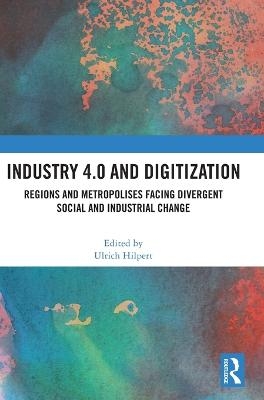
Industry 4.0 and Digitization
Routledge (Verlag)
978-1-032-27304-4 (ISBN)
Industry 4.0 and digitization are new transformations for regions and metropolises where technologies are applied but regionally can appear as a continuation of innovative processes where it is developed. The divergent presence of competences creates a selectivity process among regions. There are individual industry-location-nexuses formed out of competences of industries, labour force and research which are complemented by public policies providing support towards such adaptation of innovation and change. Regional societies formed from skilled and educated labour become an important basis for participation in innovation and supply chains. Since smart factories widely can be managed remotely, this also shows a concentration of decision making. Simultaneously, it forms a polycentric de-concentration, indicating some more important locations as central within the networks. These systematic changes continue to deepen over time. While public policies may match innovative opportunities at the appropriate moment, they also contribute to a continuation of uneven development and divergent societal tendencies. Industry 4.0 and digitization indicate a wide and selective change of organization associated with new technologies and innovation. While some regions and metropolises can continue to build both innovative competences and innovative societies based on innovative labour force, others will participate because of their position in supply chains.
The chapters in this book were originally published as a special issue of the journal, European Planning Studies.
Ulrich Hilpert is Professor of Comparative Government at the University of Jena, Germany; Fellow of the Academy of Social Sciences, London; Senior Fellow of the Hans-Böckler-Foundation, Düsseldorf, and has been visiting professor at a dozen universities in Europe and the United States. His main areas of research are comparative studies in technology, innovation, regional development, global networking, and skilled and university trained labour.
Introduction - spatial evolution in the light of innovative transformation: the impact of policies and institutions in divergent situations 1. Regional selectivity of innovative progress: Industry 4.0 and digitization ahead 2. The impact of Industry 4.0 on supply chains and regions: innovation in the aerospace and automotive industries 3. The transition of regional innovation systems to Industry 4.0: the case of Basque Country and Catalonia 4. The growing inequalities in Italy – North/South – and the increasing dependency of the successful North upon German and French industries 5. How does Industry 4.0 affect the relationship between centre and periphery? The case of manufacturing industry in Germany 6. Glowing cities and the future of manufacturing in the US and Europe: How digitalization will impact metropolitan areas depending on sectoral dominances and regional skill distribution 7. The Korean approach to Industry 4.0: the 4th Industrial Revolution from regional perspectives 8. Industry 4.0/Digitalization and networks of innovation in the North American regional context 9. Industry 4.0 as a ‘sudden change': the relevance of long waves of economic development for the regional level Conclusion - the complexity of reorganizing industries and value chains: challenges and selectivity of Industry 4.0 and digitization
| Erscheinungsdatum | 01.06.2022 |
|---|---|
| Verlagsort | London |
| Sprache | englisch |
| Maße | 174 x 246 mm |
| Gewicht | 449 g |
| Themenwelt | Naturwissenschaften ► Biologie ► Ökologie / Naturschutz |
| Naturwissenschaften ► Geowissenschaften ► Geografie / Kartografie | |
| Wirtschaft ► Betriebswirtschaft / Management ► Logistik / Produktion | |
| Wirtschaft ► Volkswirtschaftslehre | |
| ISBN-10 | 1-032-27304-6 / 1032273046 |
| ISBN-13 | 978-1-032-27304-4 / 9781032273044 |
| Zustand | Neuware |
| Haben Sie eine Frage zum Produkt? |
aus dem Bereich


